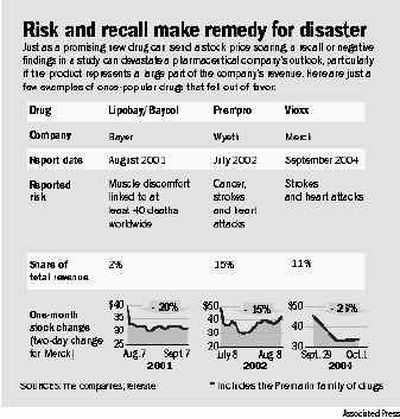Merck study offers warning for millions

TRENTON, N.J. — Vioxx was already a big success as an arthritis pain reliever, but Merck & Co. thought it could be an even bigger seller. The drug seemed to have some cancer prevention qualities, so the drug maker began a long-term study to test it for that use.
The strategy backfired for the company, which Thursday pulled Vioxx off the market. The study showed the drug doubled the risk of heart attack and stroke. At the same time, it sounded an alarm for the millions of people who took Vioxx.
A similar case arose with Wyeth’s hormone treatment Prempro two years ago. The huge Women’s Health Initiative study — launched to show that the drug could protect older women from heart disease — unexpectedly found it did the opposite and more. Not only did it raise the risk of heart attack, it also brought a greater risk of stroke and breast cancer. Sales of Prempro and another Wyeth hormone drug, Premarin, have plunged by nearly half since then.
Earlier this year, Bristol-Myers Squibb Co.’s effort to give its cholesterol drug Pravachol an edge over Pfizer Inc.’s Lipitor, the country’s top-selling drug, went awry when a head-to-head study funded by Bristol-Myers showed Pravachol was inferior.
“The only way these studies wind up getting done is if the companies see the gold at the end of the rainbow,” complained Dr. Sidney Wolfe, co-founder of Public Citizen’s Health Research Group.
He said the Food and Drug Administration needs to push drug companies harder to do long-term safety studies of drugs on the market once concerns develop.
“I think greed may be a part of it,” said Dr. John Norris, an internist, speaking of the motives behind drug companies doing more studies after they’ve already received approval. Norris is acting chief of staff at University Hospital in Newark.
University of Pennsylvania bioethicist Arthur Caplan said the problem is, “We’re relying on the fox to tell us about what’s wrong inside the chicken coop.”
FDA spokeswoman Crystal Rice said the agency’s authority is limited by law. The agency can only ask — not order — companies to do further safety studies on drugs already approved.
However, the FDA was able to require makers of antidepressants to study their safety in children under a law meant to increase testing for drugs for kids. Those studies led to findings this year that antidepressants slightly increase suicidal tendencies in children and adolescents.
As a result, FDA advisers now are urging that stringent warnings be added to package inserts for Celexa, Effexor, Luvox, Paxil, Prozac, Remeron, Serzone, Wellbutrin and Zoloft.
In some cases, experts say, such warnings on a drug’s official labeling aren’t sufficient.
Since 2002, Merck’s Vioxx had a warning about increased cardiac risks based on results of its own post-approval study, but disputed its own findings and the drug remained on the market.